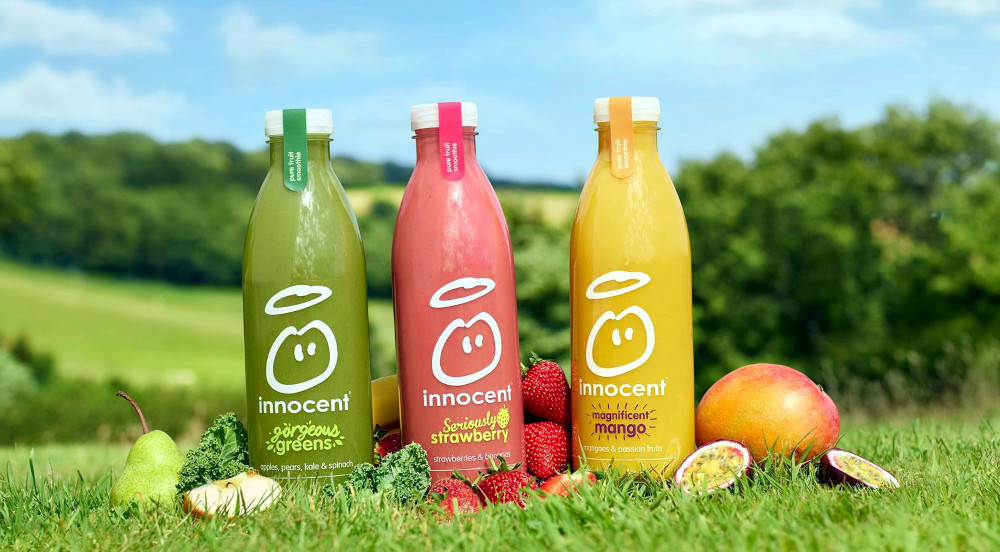innocent Drinks plans for the ‘fruiture’ with regeneratively farmed fruits & veg

Image credit: innocent
Today, UK-based innocent Drinks
announced the availability of up to £1 million in grants this year through its
enhanced Farmer Innovation
Fund.
As a business passionate about bringing the goodness of fruit and veg to people,
the fund represents an increased investment to help safeguard the long-term
supply of fruit and veg through regenerative agriculture — as innocent advances
its plans to decarbonize its supply chain.
Launched in 1999, B Corp-certified innocent’s growing
range of smoothies, juices,
coconut water and more are now sold in over 18 countries around the world — and
its mission is to get a billion more portions of fruit and veg into people’s
diets by 2030. innocent has led with its sustainability ethos from the beginning
through a growing number of social,
environmental
and
circular
initiatives; and while it has been taken to task for some of its sustainability claims,
the brand’s expanded commitment to responsible farming and ingredient sourcing,
and continued communication about its sustainability
work
— bode well for its continued progress on those fronts.
With only 12 percent of Europeans getting their five a
day,
innocent says expanding availability of responsibly farmed fruit and veg has
never been more important — and to help ensure their
availability for generations to come, it’s imperative to support farmers to
systemically change agricultural supply chains.
innocent’s Farmer Innovation Fund provides funding to its ingredient suppliers
for projects that support the transition to low-carbon farming, higher
biodiversity and fairer farming practices. With over half of innocent’s carbon
footprint coming from its ingredients, investing in regenerative farming
practices will be key to achieving a 50 percent reduction of its scope 3
emissions
by 2030.
£1 million in grants available for 2024
The fund, first launched in March 2021, aims to address the lack of funding
options available to commercial farmers and provide funds to cover losses
associated with trialing new, innovative farming practices.
Funding will be offered to all innocent ingredient suppliers, with a special
focus on those providing priority fruits — such as apples and oranges — which
produce the biggest portion of innocent’s Scope 3 emissions. Within the total
fund of £1 million, grants will be made available between £20,000 - £500,000 —
with those over £500,000 considered on a case-by-case basis.
Longer term, the fund will also cover grants for advocacy, education and
collaboration beyond innocent’s supply chains; and innocent will share its
learnings throughout the process to accelerate the transition to sustainable
farming throughout the industry.
“We’re on a mission to help people live well through the delicious goodness of
fruit & veg, working to ensure everyone gets enough today and in the future,”
said innocent CEO Nick
Canney. “That’s why we are
proud to play a part in helping our suppliers secure fruit & veg for the long
term. We see the Farmer Innovation Fund as a great opportunity to weave a strong
connection from our drinkers to our farmers by working with our suppliers to
safeguard the future supply of fruit and vegetables. So, they can continue to
play their role in delivering sustainable and healthy diets.”
The fund’s previous recipients include Döhler — which is using the grant to
reduce the carbon footprint in its apple and mango supply chains, and Agrarias
Manchegas — which is using the grant to optimize farm inputs via data management
and precision agriculture technology.
External advisory board
innocent has brought together leading industry experts to ensure funding is
allocated effectively to the projects that will have the biggest impact on
farming and agricultural practices: Dominik
Klauser, Regenerative
Agriculture Director at SAI Platform; Oliver
Williams, Corporate
Philanthropy Senior Manager at Virgin Unite;
Martin Lines,
third-generation farmer and CEO of the Nature Friendly Farming
Network; and Jyoti
Fernandes — a Dorset
smallholder farmer and head of policy at the Landworkers
Alliance.
“We need to see more investment in supporting farmers on their journey towards
de-risking and embracing regenerative farming practices,” Klauser said. “It’s
great to see businesses like innocent drinks committing to support the farmers
within their supply chain to make this transition.”
Applegate Farms aims to source entire beef hot dog portfolio from regenerative beef by the end of 2025
 Image credit: Applegate
Image credit: Applegate
Meanwhile, Applegate®, the US’s leading natural and
organic meat brand, today announced a commitment to transition its entire line
of grass-fed beef hot dogs to beef raised on verified regenerative grasslands
by the end of 2025. Implementing this change across its entire beef hot dog
portfolio is expected to contribute to the regeneration of six million acres of
grasslands, which will increase the current regenerative acreage of Applegate
suppliers by more than 2,200 percent.
“For 37 years, Applegate has led the charge for higher standards* for animal
agriculture, from the way we care for our animals to how we work to preserve the
land and planet they live on,” said Applegate President Joseph
O’Connor. “As pioneers
of the movements surrounding organic and Applegate Humanely
Raised meat and animals that are
raised with no antibiotics ever, we saw a larger opportunity for regeneratively
sourced
meat.
By working to shift our entire beef supply chain, consumers can support
regenerative practices without having to forgo our organic and natural hot dogs
they already love. This, in turn, will help to incentivize farmers and the
industry to move regenerative-agriculture practices from niche to norm.”
With two out of three US
adults
saying they eat meat frequently and cattle consistently spotlighted for their
negative environmental
impacts,
Applegate — which became a stand-alone subsidiary of Hormel Foods in July
2015 — acknowledges the need to improve cattle-grazing practices to both meet
demand and reduce livestock’s impacts on the
environment.
So, the company is doubling down on its commitment to regenerative practices
such as rotational and holistic managed grazing — which play a vital role in a
healthy food system by not only helping to restore soil health, sequester carbon
and safeguard the land against drought, wildfires and erosion; data show it
boosts levels of vital nutrients in
the meat vs conventionally raised beef.
In 2021, Applegate launched the Do Good
Dog™
— the first nationally available hot dog made with beef raised on verified
regenerative US grasslands. The creation of the product helped to transition
260,000 acres of grassland to regenerative. The Do Good Dog pilot launch and
consumer reception confirmed Applegate’s hypothesis: the company's size and
experience scaling specialized supply chains in the meat category can make
regenerative agriculture familiar and accessible in the mass market. Like
all-natural and organic before it, the company’s goal to transition to a 100
percent regenerative beef supply for all its hot dogs is just the latest example
of Applegate’s commitment to elevating the humble hot dog.
To transition the six million acres of grassland and achieve its goal of
improving land health, Applegate will work with its network of more than 250
beef farmers to implement a regenerative standard with third-party verification
through certifiers such as Land to Market —
which will allow Applegate to source the larger quantities of certified
regeneratively raised beef needed to supply its beef hot dog portfolio.
“Using Applegate Humanely Raised as our foundation, we are expanding our program
as we consider the symbiotic relationship of plants and animals and the positive
impact these regenerative practices have on the land,” O’Connor added. “We have
long believed that a holistic approach to agriculture results in a better food
system. Now is the time to scale.”
Additionally, Applegate will collaborate with umbrella frameworks such as GRASS
(Generalized Regenerative Agriculture Sourcing
Specification) and the Textile Exchange
Regenerative Outcomes
Framework
to ensure its standards are aligned with industry-accepted metrics for
ecological outcomes and animal welfare.
The expanded commitment to regeneratively grazed beef comes alongside the
release of Applegate’s inaugural Mission
Report — a comprehensive evaluation
of the impact on people, animals and the planet; as well as deep insights into
all of the programs and activities Applegate undertakes to further its mission
of “Changing The Meat We Eat®.” The report measures forward-looking
initiatives following the four pillars of its Mission Standards Index: people,
environmental sustainability, animal welfare and ingredient integrity; metrics
on each will be updated and evaluated annually.
“The publication of our Mission Report represents the first time we have
quantified the impact of our program,” said Carolyn
Gahn, Applegate’s Senior Director of
Mission and Advocacy. “In doing so, we aim to provide all of our stakeholders —
whether suppliers, retailers or consumers — with knowledge about the role they
play in our ecosystem. We are already leveraging these insights to continue to
improve the work we do for people, animals, and the planet.”
Get the latest insights, trends, and innovations to help position yourself at the forefront of sustainable business leadership—delivered straight to your inbox.
Sustainable Brands Staff
Published Mar 5, 2024 8am EST / 5am PST / 1pm GMT / 2pm CET